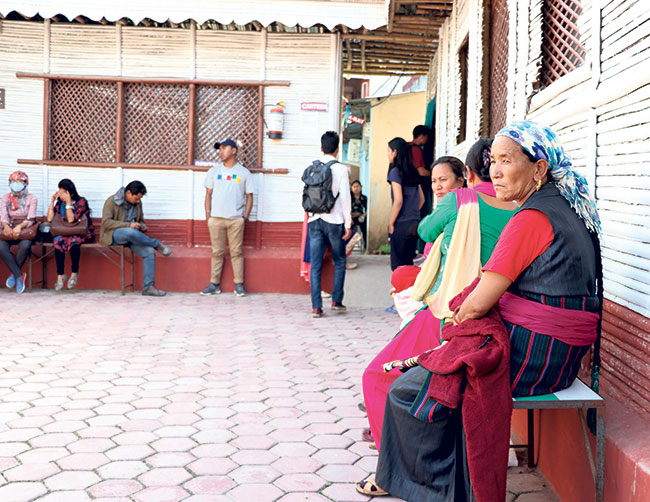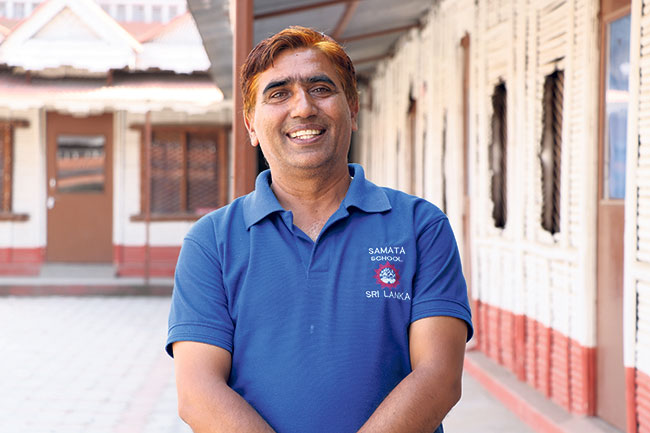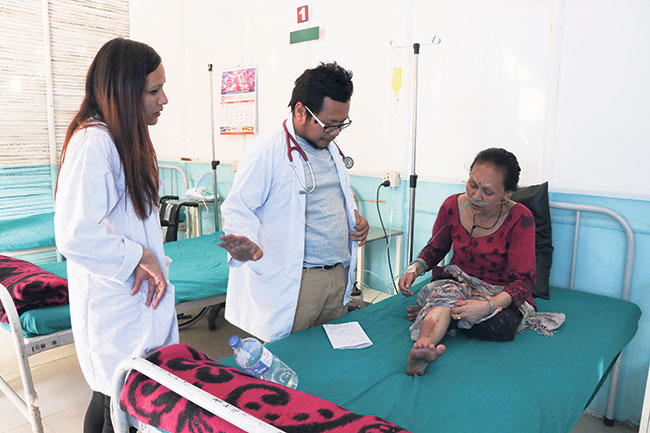According to the Human Development Report 2015 of UNDP, Nepal has the lowest number of doctors per person in South Asia. Nepal has only two physicians for every 10,000 people, which does not meet the World Health Organization standard of 10 doctors for 10,000 people. This also indicates lack of proper awareness and promotion of health facilities.
One of the major health issues for Nepal is that health care services are excessively expensive, which makes the services beyond the reach of majority of the population. People wait until the last moment to go to the hospital just because the services are unaffordable. To address this problem at least to some extent, Samata Hospital is providing quality health services at minimal price.

Founding Samata Hospital
These days, you don’t even get a plate of momo for Rs 100. But Samata Hospital at Baudha in Kathmandu is providing health services to the public for just Rs 100 for a year. It has been possible due to the efforts by hospital founder Uttam Sanjel, and actors Madan Krishna Shrestha and Hari Bansha Acharya, popularly known as MaHa duo.
Govt providing conditional grant of Rs 1.08 billion to construc...

 Seeing the poor services provided by government hospitals and unaffordable prices of private hospitals, the idea of delivering quality health care services at Rs 100 came to Sanjel's mind some 18 year back.
Seeing the poor services provided by government hospitals and unaffordable prices of private hospitals, the idea of delivering quality health care services at Rs 100 came to Sanjel's mind some 18 year back.
“For me, health is present and education is future. A child can wait until he or she becomes 23 to complete master's degree, but they cannot wait even a second to get rid of a toothache. So, health services cannot be postponed," Sanjel said. "But in Nepal, most people can’t afford to pay for proper health care.”
Samata Hospital was established on June 24, 2017, as a small clinic. It later grew into a polyclinic with 50 beds, and eventually into a hospital with 100 beds. The area spreads over nine ropani of land. And just like the Samata School -- Sanjel's Rs 100 school project -- the hospital buildings are made up of bamboos to make them earthquake proof, peaceful, and eco-friendly.

Providing preventive health care
It is better to take preventive measures instead of treating a disease once it develops. In this sense, Samata Hospital is creating awareness among the public through its services. About this, Sanjel explained: "Those who cannot afford to go to hospitals get de-motivated, thinking that they won't be treated well by the doctors at hospital. And we are trying to change this thought by giving services at minimum rates. Senior citizens and differently-abled people get free check up at our hospital.”
At the hospital, one can get whole body checked up just at Rs 1500 that includes blood test, ECG, urine test, ultrasound, blood sugar test, et cetera and at Rs 100, you will be checked by a physician. “You will have to spend minimum Rs 6,000 at a private hospital and those who cannot afford it, don’t go to hospital, increasing the risk or worsening the disease. If the sick went to hospital earlier, their problems could be diagnosed earlier and treated on time,” added Sanjel.
Support from a group of doctors
“Without the doctors' help, Samata Hospital couldn’t sustain,” Sanjel shared. “Because of cooperation from 25 doctors in our team, people have been able to get quality health services here. They have excellent medical knowledge, and they give more time to the patients. The doctors who work here are working part-time with a good intention to help the underprivileged".
Dr Neeta Kafle, a pathologist, is among the 25 doctors. She becomes happy to see the patients treated, and takes it as a social service activity rather than a job. “Though I am not paid high, I’m happy here. I’m planning to be here next year as well,” she said.
Likewise, Dr Bishal Gurung, a physician, shared: "It is more important to give happiness to others than earn money. Working here makes me happy. And I feel grateful to be able to help the needy."
Patients are also satisfied with the services provided here. Laxmi Khadka, 73, came from eastern Jhapa district after reading about the hospital on the internet. She and her son found their journey to Kathmandu fruitful as she got cured from the aches in her body. She said: "I was skeptical about good quality services at such a nominal fee, and I did not believe that my disease would be cured. But after getting treatment here, I am glad that I came."
Further plans
Sanjel is planning to start providing paramedical education at the fee of Rs 100 per month. His plan is to run a college providing certificate and bachelor level courses in nursing and dentistry.
"We are lagging behind by at least 200 years in education and health care when compared to first world countries," Sanjel said. "Medical education is extremely expensive here, and we are planning to give this education at the lowest price possible."



































